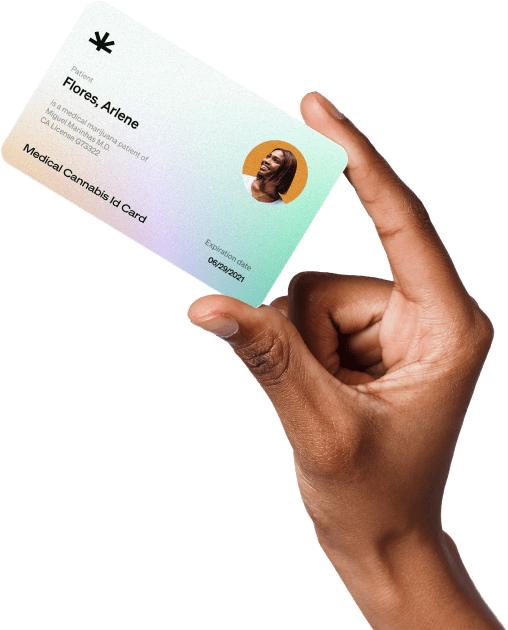Can You Use Cannabis If You Have Lupus?

Article written by
Emma Stone
Content reviewed by

Dr. Lewis JasseyMedical Director - Pediatric Medicine
Emerging studies and anecdotal reports suggest cannabis may offer therapeutic benefits to people with lupus, such as relief from pain and inflammation. However, randomized clinical trials are still needed to evaluate if medical cannabis is a safe and effective treatment for lupus symptoms.
With that said, some states list lupus as a qualifying condition for medical marijuana, suggesting that people with lupus can use cannabis as long as they are under a doctor’s supervision.
Get Your Medical Card
Connect with a licensed physician online in minutes.
What Is Lupus?
Lupus is a chronic autoimmune disease in which the body’s immune system attacks healthy tissue. It affects about 1.5 million Americans and roughly five million people worldwide. Joint stiffness and chronic pain are characteristic symptoms of this condition, making everyday life challenging for lupus patients.
There are four different kinds of lupus:
- Systemic lupus erythematosus (SLE), the most common form of lupus
- Cutaneous lupus, a form of lupus that affects the skin
- Drug-induced lupus, a lupus-like disease triggered by certain prescription medications
- Neonatal lupus, a condition that affects infants of women with lupus
Lupus can affect many parts of the body, including the joints, skin, and vital organs. Some of its most common symptoms include:
- Extreme fatigue
- Joint swelling
- Swelling in the feet or hands
- Sensitivity to sunlight or fluorescent lights (photosensitivity)
- Chest pain when breathing deeply
- Butterfly-shaped rash that spans the cheeks and nose
- Mouth and nose sores
- Hair loss
Anxiety, depression, and insomnia often coincide with lupus, which can trigger flare-ups and weaken the immune system.
Treatments for lupus currently include NSAIDs, corticosteroids, antimalarial drugs, BLyS-specific inhibitors, and immunosuppressive agents. Individuals may be given different combinations of medications as their symptoms change.
Unfortunately, many of these medications have been linked to side effects, particularly for pregnant women. Medical marijuana has recently captured attention as a potential treatment for lupus patients due to its ability to ease inflammation, chronic pain, and swelling.
Is Lupus a Qualifying Condition for Medical Marijuana?
The states of New Hampshire, Hawaii, and Illinois identify lupus as a qualifying condition for medical marijuana.
Lupus is not explicitly identified as a qualifying condition in other states such as Florida, New York, California, and Virginia. However, these states allow medical practitioners to prescribe medical marijuana for chronic or persistent medical conditions in cases where they believe it would be a suitable treatment.
Other states, such as Colorado and Oregon, allow patients and doctors to apply to the state regulatory or medical board for permission to access medical cannabis for non-specified conditions.
Potential Benefits and Risks of Using Cannabis If You Have Lupus
According to the Lupus Foundation of America, research suggests that cannabinoids may offer relief in treating the pain associated with rheumatological conditions such as lupus. However, the organization also points out that cannabis may cause drug interactions or potential adverse effects when taken with some lupus medications.
If you have lupus and are contemplating consuming cannabis to help manage your symptoms, you must be aware of the potential benefits and risks of doing so.
Potential Benefits
A recent study explored the effects of medical cannabis on pain caused by rheumatological disorders. The researchers found that almost 20% of patients living with rheumatologic diseases consume cannabis, with cannabis consumption linked to an improvement in pain intensity.
Another study investigating the potential effects of medical cannabis on autoimmune diseases reported that animal studies found convincing evidence that cannabis could modulate the immune system. Moreover, the high density of CB2 receptors on immune cells suggests that medical cannabis could be a uniquely effective treatment for targeting this part of the endocannabinoid system (ECS).
Finally, anecdotal reports from lupus patients suggest that weed may help to ease diverse lupus symptoms, such as body and joint pain, disturbed sleep, rashes, and low energy.
Some lupus patients mention a preference for CBD oil or cannabis in oral formats, as this reduces further strain on the lungs (lupus can make breathing feel difficult sometimes). Others point out that using marijuana allows them to reduce their intake of prescription drugs.
Potential Risks
Researchers emphasize that there is limited knowledge of the long-term safety and efficacy of medical cannabis for patients with autoimmune disorders. Since there is a lack of randomized controlled trials explicitly studying lupus patients and medical cannabis, it’s essential to proceed cautiously.
In addition, there are potential drug interactions between weed and common medications. Research suggests that mixing cannabis with NSAIDs, commonly used to treat lupus, may lead to adverse effects. Although, it’s important to note that this is only one case study’s findings.
Some studies suggest that CBD may reduce opioid and NSAID intake. However, CBD may affect how the body metabolizes certain immunosuppressant medications and increase their concentration in the blood, contributing to toxic side effects.
The Lupus Foundation of America recommends that individuals with lupus who are thinking about trying medical marijuana talk with their doctor first. The Foundation cautions that cannabis may interact with medications or worsen symptoms, so it’s vital to consult a physician to evaluate whether it’s safe to combine cannabis with other existing lupus treatments.
The Bottom Line
Research and anecdotal reports suggest that medical cannabis may hold promise for people with lupus due to its analgesic, anti-inflammatory, and immunomodulatory properties. However, experts and researchers underline a need for more robust, large-scale studies on human populations to support its use.
There is also a potential risk for drug interactions to occur in lupus patients currently taking a prescribed medication. If you are thinking about experimenting with medical marijuana to ease symptoms associated with lupus, consult with a medical professional first.
Get Your Medical Card
Connect with a licensed physician online in minutes.



